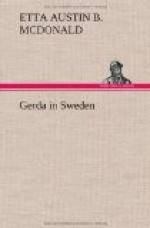Karen laughed. “How I would like to see it,” she said.
“Oh, I have it now. I will show it to you,” and Gerda crossed the room and opened one of the chests which were ranged against the wall.
“This is my own chest, where my grandmother keeps everything I make,” she said, as she lifted the cover and took out a bundle. Opening the bundle, she unrolled a funny little rug.
Pointing to a wide black stripe in the middle, Gerda said, “That was for the time I broke the vinegar jug, and spoiled Ebba Jorn’s dress.”
“Oh, tell me about it!” cried Karen.
“No,” replied Gerda, “it was too naughty to tell about;” and she put the rug quickly back into the chest.
“I didn’t know you were ever naughty,” said Karen, laughing merrily. Then, as the two little girls put on their caps and took up their baskets to go flower-hunting, she asked, “Who is Ebba Jorn?”
“She lives across the lake, and she is going to be married to-morrow,” answered Gerda. “We can walk in her procession.”
Karen gave a little gasp of pleasure. “Oh, what fun!” she exclaimed. Then she stopped and looked down at her dress. “But I have nothing to wear,” she said. “All my prettiest dresses went home on the steamer with your father.”
“We shall wear our rainbow skirts,” Gerda told her. “And you can wear one of mine.”
Just then she caught sight of a crowd of boys and girls in a distant meadow, and ran to join them; calling to Birger and Karen to come, too. “They are gathering flowers to trim the Maypole for the midsummer festival,” she cried.
It is small wonder that the people of the Northland joyously celebrate the bright, sunny day of midsummer, after the cold days and long dark nights of winter. It is an ancient custom, coming down from old heathen times, when fires were lighted on all the hills to celebrate the victory of Baldur, the sun god, who conquered the frost giants and the powers of darkness.
On Midsummer’s Eve, the twenty-third of June, a majstang is erected in every village green in Sweden. The villagers and peasants, young and old, gather from far and near, and dance around the May-pole all through the long night, which is no night at all, but a glowing twilight, from late sunset till early dawn.
There was a great deal of work to be done in preparation for this festival, and such a busy day as the children had! They gathered basketfuls of flowers, and long streamers of ground pine, which they made into ropes and wreaths. They cut great armfuls of birch boughs, and decorated the little farmhouse, inside and out; placing the graceful branches with their tender green leaves wherever there was a spot to hold them. Over the doors and windows, up and down the porch, along the fence, and even around the well, they twined the long ropes and fastened the green wreaths and boughs.
After a hasty lunch they rowed across the lake and spent the afternoon at the village green, helping to dress the tall majstang; and when their supper of berries and milk and caraway bread was eaten, they were glad enough to tumble into bed, although the sun was till shining and would not set until nearly eleven o’clock.




